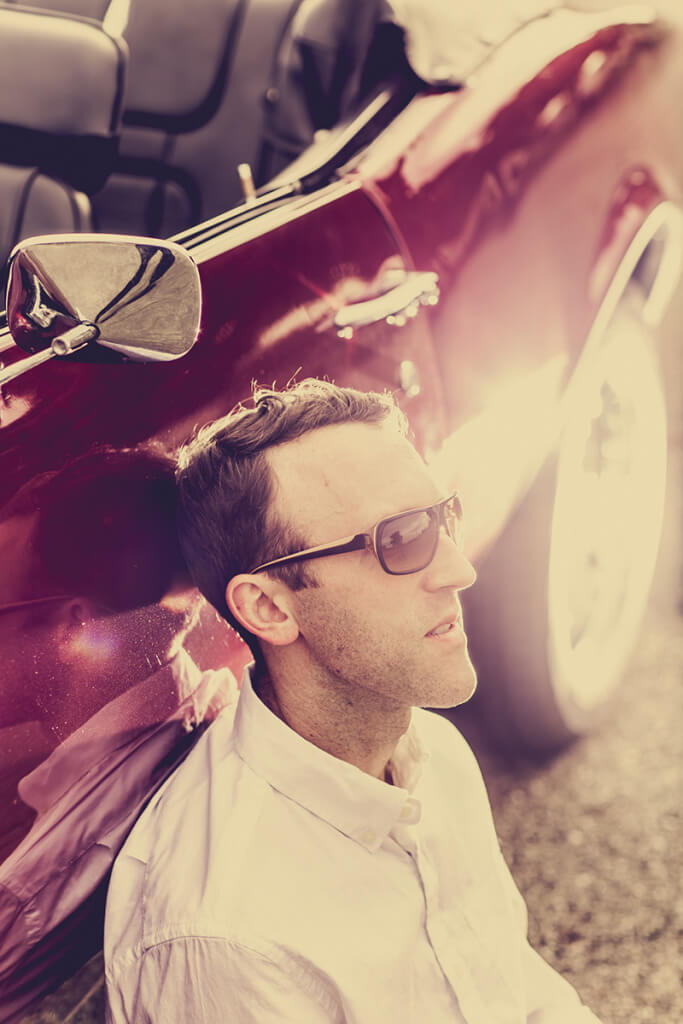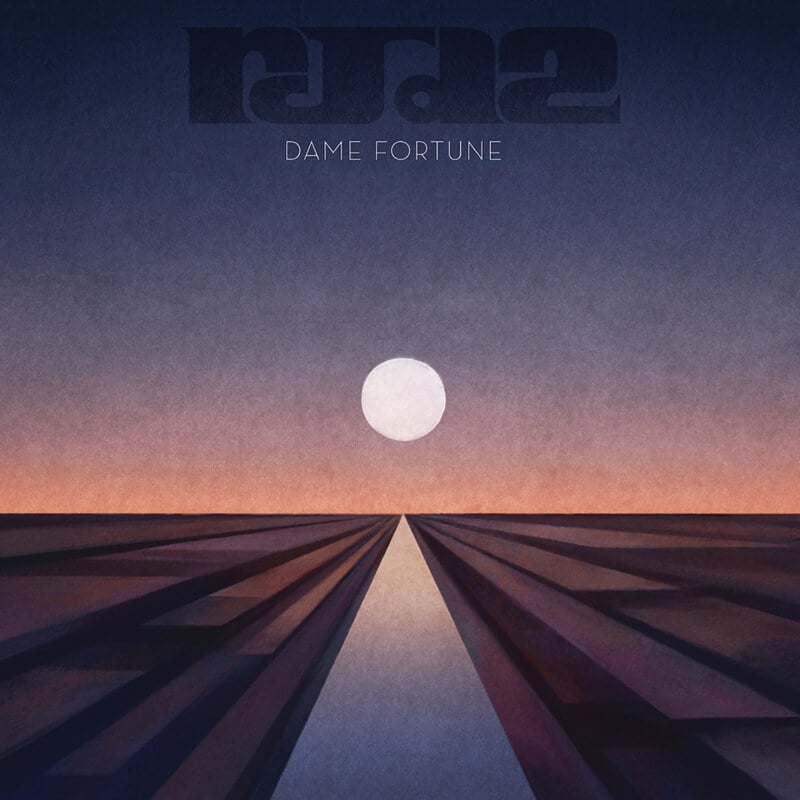RJD2: The Soul in the Machine
The music video for “Descended From Myth” concerns itself with an intricate machine that from a distance resembles the engine of a sports car. Upon closer inspection, its interlocking parts reveal themselves to be made up of horns, keys, drums, and a bass guitar, and the complex contraption springs to life with music. The sounds are of a past era, but rearranged into something powerful and cinematic, brand new yet timeless.
This is the music of Ramble Jon Krohn, aka RJD2. He’s readying to release his latest LP Dame Fortune, his tenth album since his 2002 breakout Deadringer. While mainstream hip-hop left the turntable for the laptop and the sampler for the sounds of software, RJD2 has built himself a soulful machine made out of vinyl, analog synthesizers, and a drum set in his basement. RJ is conductor and mechanic, doing all the production and repairs himself while carving an independent path through hip-hop for more than 15 years. He’s beholden to no one, and that’s just the way he likes it. We caught up with the inventive musician six years after his last Performer cover story…
From the beginning your music has had a cinematic twist, and this album pulls in orchestral and rock sounds. How do you combine all these disparate influences?
Movies and books have a huge influence on how I make records. I may not be shooting for the cinematic thing, but it creeps into your head in terms of the spectrum of what can be done. Look at some of the Morricone scores, they don’t have melodic sense like a pop song but they stick inside you like a pop song; they tell the story without words. Once you absorb that it can change the parameters of what you think you can do. John Carpenter’s scores in the ’80s are hyper-minimal but hyper-effective, and you realize that you can strip music down really far and keep the listener’s attention.
Where do you write and record?
Basically everything happens at home. Compositionally it’s impossible to get anything done without being there, because I need to be holding an instrument or in front of a machine that makes sound. I’m still doing dates, but not touring as heavily as when I was younger. So, I’ve got more time to be home and work on writing. I had a son and that was a big part of the change; I just want to be home more and be around for his childhood.

You’ve turned your entire house into a recording studio with lines running from instruments in different rooms to a central console. Combined with your legendary collection of vintage synths, your home recording setup is the envy of musicians everywhere.
Yeah, I’m living high (chuckles). What’s important to me is reinvesting a percentage of every dollar I make back into the studio and I’ve been doing this professionally for 16 years, so I’ve had time to build up a pretty good stock. People may look at my studio and feel envious, but they need to realize it represents many hours of soldering, restoration, troubleshooting, and a lot of things that aren’t making music.
I got heavy into vintage synths, and one of the natural outgrowths of that is that I’ve also gotten into synth restoration, because it’s unsustainable to be into old synths without being able to fix them yourself. The problem then is that you develop an emotional attachment to the machine. After stripping down the board and rebuilding the power supply and finally getting it working perfectly, it’s hard to sell something.
Do you have any favorite synths or instruments you like to write with?
My two favorite synths of all time have to be the CS-80 and ARP 2600. The CS-80 is an amazing polysynth. The presets are by and large unusable, but the panel section, where you can craft your sounds, is where the magic happens. The 2600 is my favorite monosynth of all time. The panels are laid out in away that really facilitates sound exploration, to reset it to zero just push everything down.
I pretty much only use analog, the Jupiter 8 is the end of the synth era I really deal with. It’s not that I dislike digital synths, I just don’t have a lot of experience on them. The sound doesn’t suck me in the same way that vintage synths do. If I was obsessed with early-’90s house or New Order I’d probably love those synths, but I’m obsessed with George Duke.
One of the fascinating things about analog synths is that there’s a cross talk between the programming of the instrument and the passage you end up writing on it. If you just sit down with a preconceived idea of what passage you’re going to play, it’s easy to scroll through presets and find no patches that sound good. If you can learn to adjust your passage to the sound that you develop, that opens up a whole new world for me. If you play what Vangelis wrote on the CS-80 on any other instrument it wouldn’t have that same effect. If you put Monk on a CS-80 it’s not going to sound as good as Vangelis. If you’re not willing to talk about programming the machine you’re leaving meat on the bone.
I also find Rhodes easy to write on. They highlight chord voicings in a way other instruments can’t, somehow. Where you play certain voices, octave-wise, on a Rhodes can really impact the sound and feeling you get.

This record has some of your most political work to date. Why start now?
I’d like to think the beginning of any political statement that could be made would first come from a place of speaking honestly about a concern. I’ve spent my career shying away from these things, partially because I felt that if I wasn’t providing a solution, what good was there in even discussing it? Over the last couple years, I’ve realized that addressing an issue is a form of validating that issue and can, hopefully, contribute to us as a society working towards a solution.
You’re outputting nearly an album a year while touring and running your own label. How do you keep it up? Where does the energy come from?
I would say the average person probably has a much more robust social life than me. The years that led up to me going pro were a time in my life when I was doing ten to fourteen hour days centered around music and honing my craft. During that time, I got habituated to curtailing my social life. I don’t watch much TV and don’t see my friends as much as I would like, but it’s OK because I’m addicted to learning. I don’t do sitting on the couch and tuning out; I always need to be occupied and engaged.
Do you have advice for upcoming artists?
Make sure you’re having fun making music. Everyone has to have some part of their creative sphere that is sacred, off limits in relation to commerce. I see a lot of kids end up not liking music because they’ve made it into a career. What’s the point of doing it if you’re not having fun? Expect there to be some threshold of the job that isn’t fun, but don’t let that threshold be 100%.
Much sadder than all the people who didn’t make a career out of it to me are all the people who nuked their passion in pursuit of ‘making it.’ I know guys who are bill collectors by day and rap at night, and those guys are way happier. They may hate their job, but they’re happier because they still have the release through music. When the music goes, what else do you have?

RJD2
Dame Fortune
Standout Track: “The Sheboygan Left”
BUY NOW at iTUNES
Follow on Twitter @rjd2
photos by Nick Fancher
